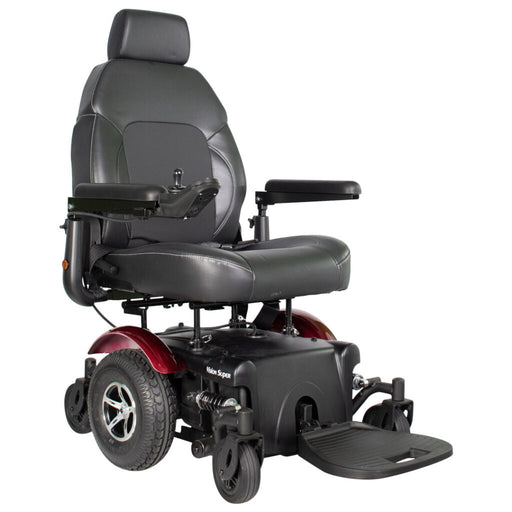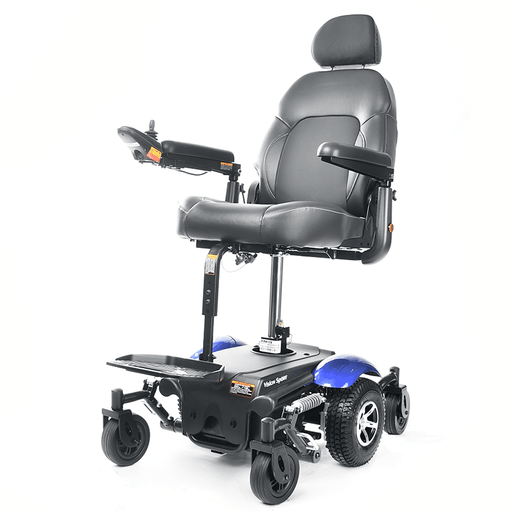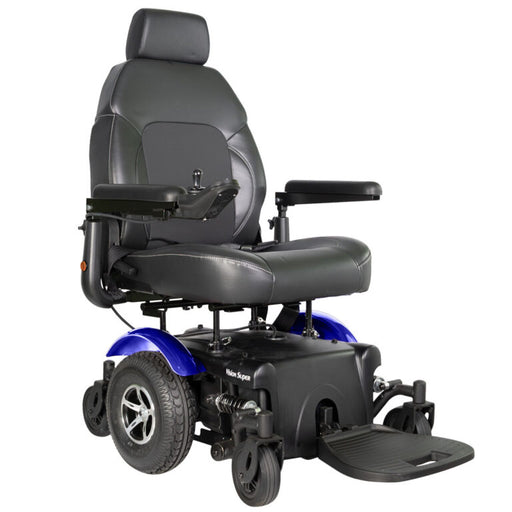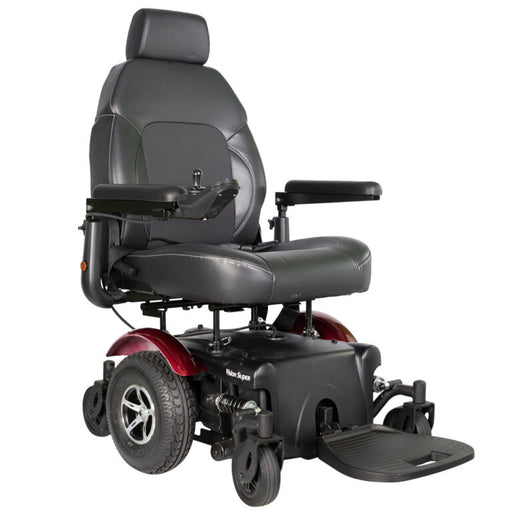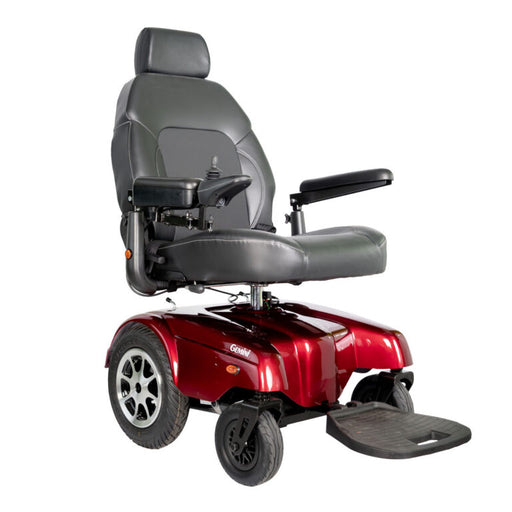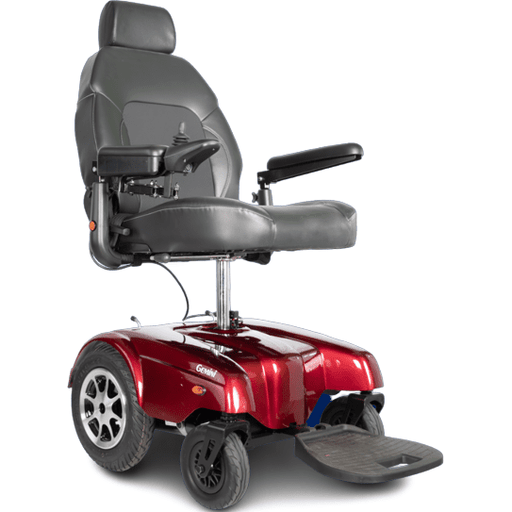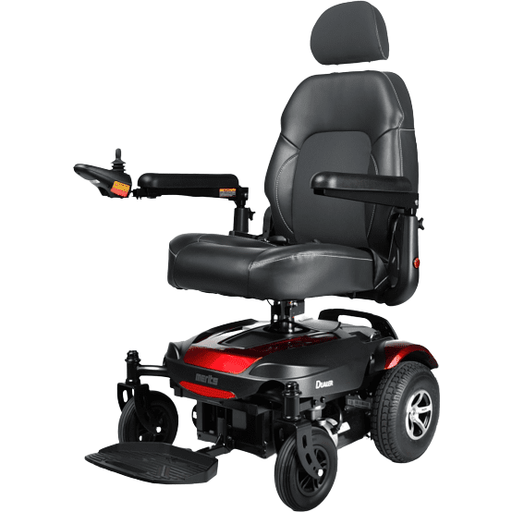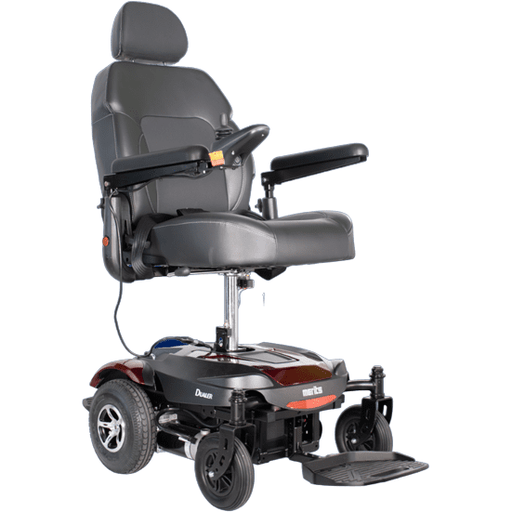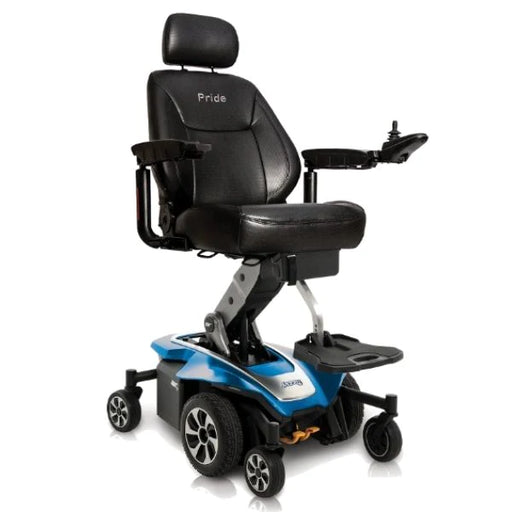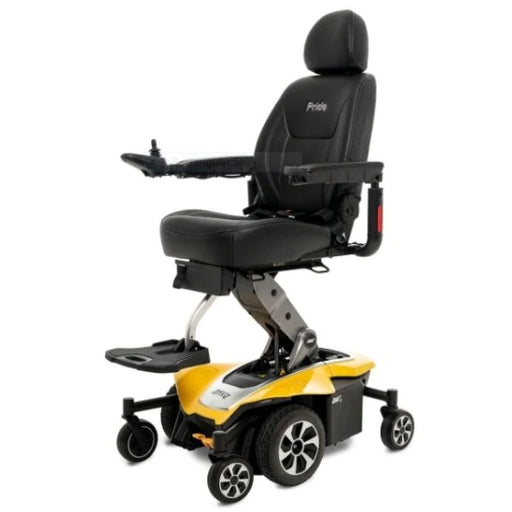Mon-Sun 9AM - 9PM EST
Elevating Power Wheelchairs
Elevating power wheelchairs are a type of motorized wheelchair that allows users to adjust the height of their seat. This feature can be incredibly helpful for individuals who need to reach higher surfaces, such as kitchen counters or shelves, or who want to engage in face-to-face conversations with others while standing. With elevating power wheelchairs, users can experience greater independence and improved quality of life.
These wheelchairs are designed with lifting technology that makes transferring in and out of the chair much easier for both the user and their caregiver. They typically have mid-wheel drive and active-trac suspension, which provides maximum stability and maneuverability. In addition, many elevating power wheelchairs have tight turning radiuses, making them ideal for use in tight spaces. Elevating power wheelchairs, also known as elevating electric wheelchairs or elevating wheelchairs, are mobility devices that provide the user with the ability to elevate and lower the seat height. This feature is particularly useful in situations where the user needs to reach higher surfaces or interact with people at eye level. The Jazzy Air 2 elevating power wheelchair is a popular model that can elevate up to 12 inches in just 11 seconds. This allows the user to reach high cabinets, shelves, and other elevated surfaces with ease. The Jazzy Air 2 also features mid-wheel drive for enhanced maneuverability and stability, making it a great choice for indoor and outdoor use. Elevating power wheelchairs typically come equipped with a variety of features to provide the user with a comfortable and safe experience. These features may include: Elevating power wheelchairs are often prescribed for individuals with permanent physical disabilities who require the ability to elevate their seat height for improved independence and quality of life. They may also be prescribed for individuals who spend a significant amount of time in a wheelchair and require the ability to reach higher surfaces. Elevating power wheelchairs are designed to provide mobility and independence to individuals with limited mobility. These wheelchairs come with a range of features that ensure a comfortable and safe ride. Here are some key features of elevating power wheelchairs: One of the most important features of an elevating power wheelchair is its elevating seat. This feature allows the user to adjust the height of the seat to reach high shelves, cabinets, or other elevated surfaces. Some elevating power wheelchairs come with a single post elevating seat, while others use a scissor mechanism to elevate the seat. Many elevating power wheelchairs come with a powered recline feature that allows the user to adjust the angle of the seat back for added comfort. This feature is especially useful for individuals who spend long periods in their wheelchair. Adjustable armrests and headrests are also important features of elevating power wheelchairs. These features allow the user to customize the chair to their specific needs for added comfort and support. The joystick is the primary control for an elevating power wheelchair. It allows the user to navigate the chair in any direction with ease. The turning radius is also an important feature to consider, as it determines the maneuverability of the chair in tight spaces. Elevating power wheelchairs come in a range of seat sizes to accommodate users of different sizes and shapes. It's important to choose a chair with the right seat size to ensure comfort and support. Overall, elevating power wheelchairs are designed to provide users with increased mobility and independence. These chairs come with a range of features that ensure a comfortable and safe ride. When it comes to Elevating Power Wheelchairs, there are several major brands and models that stand out. These brands have developed a reputation for providing high-quality products that are both reliable and durable. Here are some of the most popular Elevating Power Wheelchair brands and models: Merits Health is another brand that has gained a reputation for producing high-quality power wheelchairs. Their Vision Sport and Vision Super models are both popular choices for those in need of an elevating power wheelchair. The Vision Super is particularly noteworthy, as it has a weight capacity of up to 450 pounds. The Gemini power wheelchair is another popular choice for those in need of an elevating seat. This model is designed to provide maximum comfort and support, with a range of features including a fully adjustable headrest and footrest. It also has a weight capacity of up to 450 pounds, making it a good choice for larger users. The Dualer power wheelchair is a relatively new player in the market, but it has already gained a following thanks to its innovative design. This model features a unique dual-motor system that provides exceptional stability and control, even when the seat is elevated. It also has a range of other features, including a fully adjustable seat and footrest. Overall, there are many different brands and models of Elevating Power Wheelchairs to choose from. When selecting a wheelchair, it's important to consider factors such as weight capacity, range, and overall durability. By doing so, users can ensure that they select a model that meets their needs and provides them with the mobility and independence they require. Elevating power wheelchairs are designed to offer a range of benefits to users. These chairs are equipped with power elevating seats that allow users to adjust their height and improve their mobility, access, and independence. Here are some of the benefits of using elevating power wheelchairs: Elevating power wheelchairs enable users to reach higher places, such as shelves and cabinets, without the need for assistance. This feature also helps users to navigate uneven terrain and navigate around obstacles with ease. The increased height of the chair allows users to maintain eye contact with others, which can improve social interactions. Elevating power wheelchairs allow users to perform activities of daily living (ADLs) without the need for assistance. Users can adjust the height of the chair to perform tasks such as cooking, cleaning, and reaching for items without the need for assistance. This feature also helps users to maintain their independence and reduces their reliance on caregivers. Elevating power wheelchairs enable users to maintain eye contact with others, which can improve communication and social interactions. This feature is particularly useful in social situations, such as meetings, family gatherings, and other events where eye contact is important. Elevating power wheelchairs are designed to be highly maneuverable, making them ideal for use in tight spaces. The chairs are equipped with advanced suspension systems that provide a smooth ride, even on rough terrain. The chairs are also highly responsive, making them easy to maneuver in crowded spaces. Elevating power wheelchairs reduce the strain on caregivers by enabling users to perform tasks independently. The chairs are equipped with advanced safety features that reduce the risk of injury and provide peace of mind to caregivers. The chairs are also easy to operate, making them convenient for caregivers to use. Overall, elevating power wheelchairs offer a range of benefits to users, including improved mobility, access, independence, eye-level communication, maneuverability, and caregiver convenience. These chairs are designed to provide users with a greater degree of freedom and independence, allowing them to live life on their own terms. When it comes to elevating power wheelchairs, safety and stability are crucial factors to consider. These wheelchairs are designed to elevate the user to a higher position, which means that they must be built to maintain stability and safety when moving at that height. One important aspect of safety and stability is the suspension system. The Jazzy Air 2 Elevating Power Wheelchair, for example, features Mid-Wheel 6® with Active-Trac® Suspension, which provides enhanced performance and maximum stability both indoors and out. This suspension system helps to absorb shocks and vibrations, providing a smooth and stable ride for the user. Another important factor is the front and rear suspension. A good suspension system in both the front and rear of the wheelchair helps to ensure stability and safety, especially when navigating uneven terrain or going up and down curbs. In addition to the suspension system, there are other safety features to consider. For example, some elevating power wheelchairs come with anti-tip wheels, which help to prevent the wheelchair from tipping over. Other safety features may include a seat belt, adjustable footrests, and a joystick controller with a safety horn. Overall, when choosing an elevating power wheelchair, it is important to consider the safety and stability features. Look for a wheelchair with a sturdy suspension system, both front and rear, as well as other safety features such as anti-tip wheels and a seat belt. With the right wheelchair, users can enjoy the benefits of elevated seating while still maintaining safety and stability. When choosing an elevating power wheelchair, there are several factors to consider to ensure that the chair meets the user's needs and provides a comfortable and safe experience. One of the most important considerations is the weight capacity of the chair. The weight capacity should be sufficient to accommodate the user's weight, as well as any additional weight from accessories or equipment. The type of drive and maximum speed of the chair should also be considered. Rear-wheel drive chairs tend to have better traction and stability on uneven terrain, while front-wheel drive chairs are more maneuverable in tight spaces. The maximum speed of the chair should also be appropriate for the user's needs and abilities. The battery range and battery life of the chair are also important considerations. The battery range should be sufficient to meet the user's needs, and the battery life should be long enough to provide a full day of use without needing to be recharged. The width of the chair and the size of the foot platform should also be considered. The chair should be wide enough to provide a comfortable seating position, and the foot platform should be large enough to accommodate the user's feet. For users who plan to use the chair outdoors, the chair should be designed for outdoor use and have appropriate features such as larger wheels and a more durable frame. Portability is also an important consideration for users who need to transport the chair frequently. It is important to choose an elevating power wheelchair that is classified as an FDA Class II medical device, which ensures that the chair meets certain safety and performance standards. The chair should also come with a warranty to protect against defects and malfunctions. Transferring from a wheelchair to another surface can be a challenging task for individuals with mobility impairments. Elevating power wheelchairs can help improve safety and independence with transfers by providing a higher seat height. The Centers for Medicare and Medicaid Services propose that power seat elevation equipment is reasonable and necessary for individuals using power wheelchairs when certain conditions are met. Clinicians should measure not only the power wheelchair, toilet, and bed heights from the floor (elevation of transfer), but also measure the wheeled user space around all transfer surfaces, the distance of the transfer travel, and the safe reach range in/outside their base of support. This information will help paint a diagnostic picture of the home environment and identify potential barriers to safe transfers. In a study of 24 adults using iLevel® power wheelchairs, participants elevated their wheelchair 3.9 times per day on average, including 1.0 times per day past 9 inches. However, 29% of elevation events were transient, lasting less than a minute, indicating that individuals may not need to maintain a high seat height for extended periods of time. Elevating power wheelchairs can also improve mobility limitations by allowing individuals to reach higher surfaces and navigate uneven terrain more easily. The Jazzy Air 2, for example, can elevate 12 inches in just 11 seconds, providing greater access to a variety of environments. Overall, elevating power wheelchairs can be a useful tool for individuals with mobility impairments to improve safety and independence with transfers and overcome mobility limitations in various environments. Elevating power wheelchairs have a significant impact on the users and their environment. The ability to elevate and stand up in a wheelchair provides numerous physical and psychological benefits that improve the user's overall well-being. Elevating power wheelchairs provide physical benefits such as improved blood circulation, pressure relief, and reduced muscle spasms. The ability to stand up also helps prevent muscle atrophy and contractures. Additionally, standing up and elevating the seat can improve the user's reach, enabling them to access higher shelves, cupboards, and other items. The psychological benefits of elevating power wheelchairs are equally important. The ability to stand up and elevate the seat can significantly boost the user's confidence and self-esteem. It also allows them to interact with others at eye-level, reducing feelings of isolation and loneliness. This can lead to improved social interactions and overall mental health. Elevating power wheelchairs also have a positive impact on the user's family and friends. The ability to stand up and elevate the seat allows the user to participate in various activities with their loved ones, such as cooking, gardening, and socializing. It also enables them to maintain eye contact during conversations, improving communication and strengthening relationships. Elevating power wheelchairs can also have a positive impact on the user's environment. The ability to stand up and elevate the seat allows them to access a wider range of environments, such as public transport, restaurants, and shops. This, in turn, promotes greater independence and social participation. In summary, elevating power wheelchairs provide numerous physical and psychological benefits to the user while also positively impacting their environment and relationships with family and friends. An elevating power wheelchair is a type of electric wheelchair that allows the user to raise and lower the seat. This feature enables the user to reach higher objects, such as shelves and cabinets, and to lower the seat for better access to the ground. Elevating power wheelchairs work by using a motorized lift mechanism to raise and lower the seat. This mechanism is controlled by the user through a joystick or other control device. Many elevating power wheelchairs are designed to accommodate overweight individuals. However, it is important to check the weight capacity of the specific model before purchasing. The benefits of a wheelchair that raises and lowers include improved accessibility to high and low objects, increased independence, and reduced strain on the user's arms and shoulders when transferring in and out of the wheelchair. Yes, electric wheelchairs can be lifted using a motorized lift mechanism. This feature is available on many models of electric wheelchairs, including those with elevating seats. Yes, power wheelchairs have weight limits. It is important to check the weight capacity of the specific model before purchasing to ensure that it can safely accommodate the user's weight.Read more
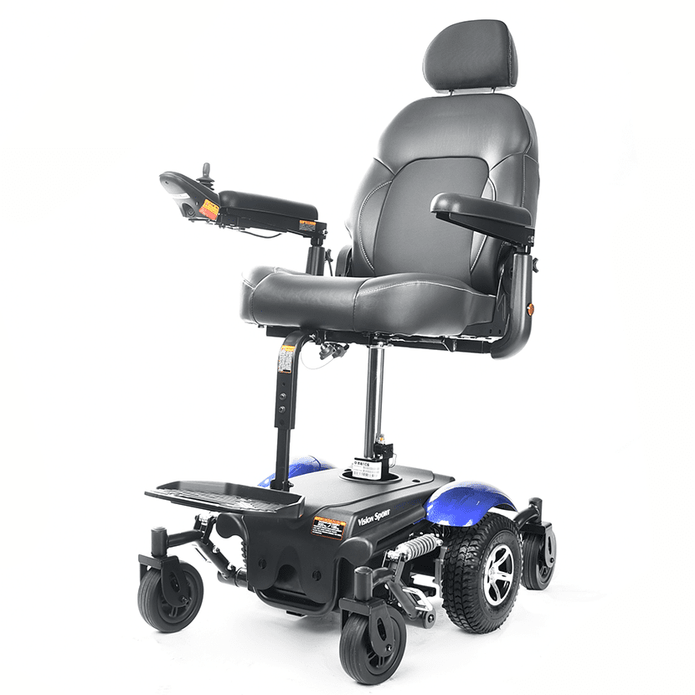
Key Takeaways
Understanding Elevating Power Wheelchairs
Key Features of Elevating Power Wheelchairs
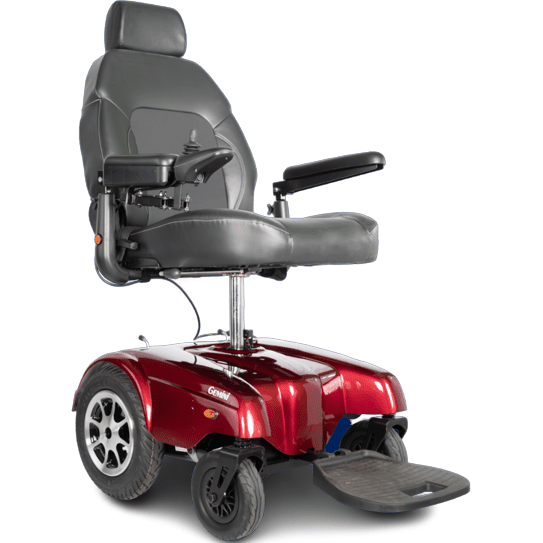
Elevating Seat
Recline
Adjustable Armrests and Headrest
Joystick and Turning Radius
Seat Size
Major Brands and Models
Merits Health
Gemini
Dualer
Benefits of Using Elevating Power Wheelchairs
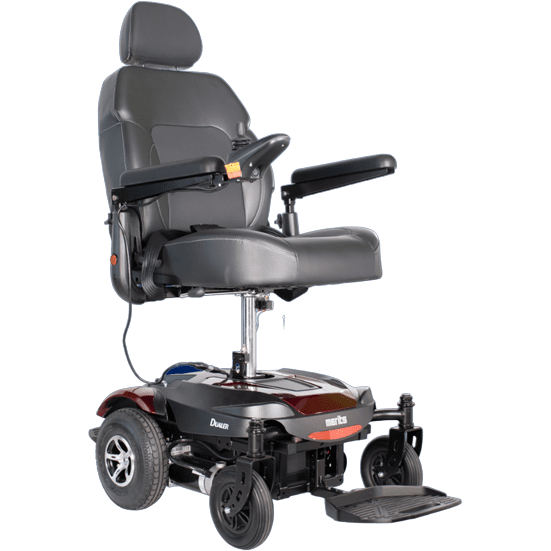
Improved Mobility and Access
Increased Independence
Improved Eye-Level Communication
Enhanced Maneuverability
Improved Caregiver Convenience
Safety and Stability
Considerations for Choosing an Elevating Power Wheelchair
Weight Capacity
Drive and Maximum Speed
Battery Range and Battery Life
Width and Foot Platform
Outdoor Use and Portability
FDA Class II Medical Device and Warranty
Transfers and Mobility Limitations
Impact on Users and Their Environment
Physical Benefits
Psychological Benefits
Impact on Family and Friends
Impact on the Environment
Frequently Asked Questions
What is an elevating power wheelchair?
How do elevating power wheelchairs work?
Are elevating power wheelchairs suitable for overweight individuals?
What are the benefits of a wheelchair that raises and lowers?
Can electric wheelchairs be lifted?
Do power wheelchairs have weight limits?
-
Merits Health Vision Sport Power Wheelchair
Merits HealthOriginal price $3,982.45 - Original price $4,508.52Original price $3,982.45 - Original price $4,508.52Original price $3,982.45$2,867.00 - $3,723.00$2,867.00 - $3,723.00Current price $2,867.00| /4.8 / 5.0
5 Reviews
Merits Health Vision Sport Power Wheelchair A cost-effective mid-wheel drive wheelchair with full suspension and the option to add a power-op...
View full details -
Merits Health Vision Super Heavy Duty Power Wheelchair
Merits HealthOriginal price $6,048.85 - Original price $7,008.85Original price $6,048.85 - Original price $7,008.85Original price $6,048.85$4,279.00 - $5,135.00$4,279.00 - $5,135.00Current price $4,279.00| /4.75 / 5.0
4 Reviews
Merits Health Vision Super Heavy Duty Power Wheelchair If you require extra weight support while maintaining independence and eas...
View full details -
Merits Health Gemini Heavy-Duty Power Wheelchair
Merits HealthOriginal price $4,359.00 - Original price $4,989.66Original price $4,359.00 - Original price $4,989.66Original price $4,359.00$3,207.00 - $4,071.00$3,207.00 - $4,071.00Current price $3,207.00| /4.62 / 5.0
8 Reviews
Merits Health Gemini Heavy-Duty Power Wheelchair The Gemini power wheelchair from Merits Health is a great mix of comfort and functionality. With a...
View full details -
Merits Health Dualer Power Wheelchair
Merits HealthOriginal price $5,345.98Original price $5,345.98 - Original price $5,345.98Original price $5,345.98Current price $3,423.00$3,423.00 - $3,423.00Current price $3,423.00| /4.86 / 5.0
7 Reviews
Merits Health Dualer Power Wheelchair The Dualer Power Wheelchair by Merits Health offers versatile drive operation, allowing users to swit...
View full details -
Pride Jazzy Air 2 Elevating Power Wheelchair
Pride MobilityOriginal price $5,399.00Original price $5,399.00 - Original price $5,399.00Original price $5,399.00Current price $4,254.00$4,254.00 - $4,254.00Current price $4,254.00| /5.0 / 5.0
1 Review
Pride Jazzy Air 2 Elevating Power Wheelchair Introducing the Jazzy Air 2! This innovative power chair features an improved power elevating seat — ...
View full details
Let customers speak for us
from 562 reviewsMy husband loves it. I don't want to speak for him but he likes the scooter a lot. It helps him. He had some anxiety to get a scooter and how that would look, but decided to go for it and hasn't looked back.

I have had my scooter for several months now, and it has given me freedom! I always feel safe, even crossing the street. It has plenty of power, even going up hill. I bought a red one, (per my children's instructions), so I am easily seen. I am so happy with it!!!

I wish i got this product sooner. I finally got my bank account to go through and was super happy. This is a great scooter. The battery lasts for a long time and it's very easy to take apart.

This scooter is a great solid mobility scooter. Very strong build quality. The seat is very comfortable and adjusts right to my needs. Shoutout to Mobility Nest for being such kind people. Would recommend!

This is the only chair I can have because it only weighs like 20 pounds. I didn't think something would be possible but I guess technology is improving these days. Great product quality nonetheless.

I don't even know where to start. I actually first saw this on QVC but they don't sell it anymore. Did some research and ended up here. It took me a couple days to finally pull the trigger, but I am glad I did. I called expressing my concerns, but they were answered immediately. I'm glad I spent my money here. Everything is great, and I would buy again right now if I had the opportunity.

Hello,
I bought the Afiscooter C4 with the Canopy and it was a great decision. It was hard to pull the trigger but I ended up doing their monthly payment options. I've never seen a mobility scooter with this canopy and I could not be more happy with the product that I got.
If anyone is doubting, I would not be worried!

This purchase was a big deal for me and just so different with the interior mount that I was a little extra nervous. I shouldn’t have been, the folks at Mobility Nest were on top of my order every step of the way. After delivery they had arranged a local service technician come by to install the mounting system and show me how to use it. The technician, John, was kind and very knowledgeable considering it was the first one he’d seen. He told me he studied the guides online and the mounting hardware was installed easily with no need to back track.
The Quingo Flyte itself is amazing. There’s some prep to be done before loading and unloading but the baskets and chair arms go on and off easily. The coolest thing is the quingo loading and unloading itself, but the scooter is stable and easy to drive. I’m still working out my per charge range, but that will come in time.
If you are considering this Quingo Flyte I highly recommend that you order through Mobility Nest. I was in safe and caring hands the entire time. So impressed.

The Hoyer lift and rapid delivery exceeded my expectations. In this day of on line purchasing, few purchases are as good as advertised. But this Hoyer lift is well designed, built, priced right, and delivered to meet the buyers needs. Thank you so much.

This scooter is truly amazing, Everyone that sees it, asks me how I like it and I tell them it's absolutely life changing ..
Everything advertised and more..

Iam a BATKA (Bilateral Above The Knees Amputee) and was graciously donated my zinger chair by the Dover Delaware Lions Club. I use it on a daily basis, it helps me tremendously in staying active when I'm not upright walking in my prosthetic legs. It's very durable, comfortable and can go through more difficult terrain. I highly recommend zinger products for people with handicaps.

I bought this scooter in 2008 or 2009, I put thousands of miles on mine when I lived in Uptown Minneapolis and worked in downtown Minneapolis. In the summer months I would ride it to work and back daily, about 3.1 miles each way. In the winter I would keep it at my office and use it in the skyway system all winter, it worked brilliantly. I took toRead more about review stating 10 YEARS ON IT'S STILL A FANTASTIC SCOOTER FOR OUTDOOR AND INDOOR ACTIVITIES on many bike trails around Minneapolis and visited friends up to 5 miles away with complete confidence it would easily make the round trip, I also to it several state fairs and festivals, it always worked great. I had to replace batteries twice but that comes with the territory of an electric vehicle. The support from the factory was excellent, I never had any issues with the scooter and was very happy to pass it along to person with MS who still uses it to this day. I don't know how long it will keep going but for now anyway it shows not signs of stopping.

I walk the dogs and visit neighbors and this works for me. Great turning and I'm happy with it.



